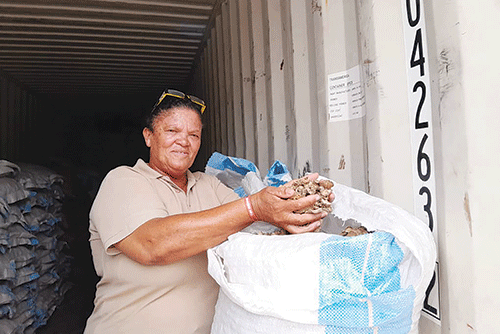KATIMA MULILO – Katima Mulilo entrepreneur Margaret van Rooi has taken the bull by the horns, selling devil’s claw on international markets such as Germany and China.
Growing up in southern Namibia, Van Rooi was introduced to the world of devil’s claw at a tender age since her family had
been harvesting the plant for decades.
Today, at the age of 53, Van Rooi – now a resident of the Zambezi region – makes handsome profits exporting tonnes of devil’s claw to international markets which is
where her biggest clientele is located.
She proudly says the devil’s claw business is booming. “It is good business. You need to have a buying-selling permit to export malamatwa (devil’s claw) all over the world.
We are exporting to Germany which is our biggest client. These days we are also exporting to China and a lot of places where it is in high demand. These people in Zambezi and Kavango regions are sitting on gold mines. They know about the devil’s claw. They are digging it for the money but not it’s medication. It is used for a lot of things,” she explained.
Malamatwa is a Silozi name for devil’s claw. Devil’s claw species are found in the Kalahari sand formation of Southern Africa including Namibia, Zambia, Zimbabwe, South Africa, Mozambique, Botswana, and Angola.
It has a long history of traditional use as a medicinal plant being used to treat conditions ranging from osteoarthritis to rheumatism and gastrointestinal complaints.
Today, it is best known for its treatment of osteoarthritis including joint pain and stiffness and as a digestive aid.
The villagers around Zambezi harvest the devil’s claw roots and sell them as a dry product to her before she cleans and packs them for international markets.
“We sort out the roots in first, second, and third grades. I have clients buying first grade while others are buying second, and others want third grade. That is why we have different prices. We don’t deal with anyone who has no permit to harvest,” Van Rooi said.
Once sorted, trucks load the containers with tonnes of devil’s claw to Walvis Bay for shipping to international markets. The heaviest bag weighs 50kg.
The devil’s claw harvesting season runs from 1 March until 31 October for the plant to recover. According to her, dry roots can cost anything between N$20-N$45 per kg depending on the quality of the product.
“The elderly around our villages are suffering a lot. If they can harvest the roots and sell them, it will make a difference. It is a good business. If they have two to three bags and they want to sell… a bag is 10kg and you want to sell it to me for N$40 per kg, then it’s N$400. For three bags, they can get N$1 200 which can be per day. They cannot survive on the N$1 300 monthly social grant. It is not possible,” she maintained.
Van Rooi has employed about 21 workers for sorting the devil’s claw.
“I started this business long time ago when I was very young with my mother, father, grandmother, and grandfather some 17km outside Windhoek with Namibian-German guys. I started harvesting malamatwa in Zambezi, Kavango regions, and Otjozondjupa around Okakarara. I have been permanently working in Zambezi for the past two years,” she explained.
Van Rooi noted that aspiring entrepreneurs need to have a harvesting permit which can be obtained from the environment and tourism ministry.
“You also need a buying-selling permit where you write an exam to get your export and import permit,” she explained.
She accredited the hard work to the harvesters who are largely villagers all over the Zambezi region.
To ensure the sustainability of the endangered plant, she educates them on how to properly harvest the devil’s claw. Once the trainees complete their training courses, they receive a certificate on how to harvest and manage the endangered species.
“The villagers get a permit for harvesting and the places where to harvest in the region. Some people don’t know how to harvest the plant. They harvest and they don’t close the holes. They harvest the whole root, and the plant will be gone within six to seven years to come as such, there will be no malamatwa anymore,” Van Rooi indicated.
She is also buying roots from harvesters around the Rehoboth area where she also offers free training courses.
– anakale@nepc.com.na


